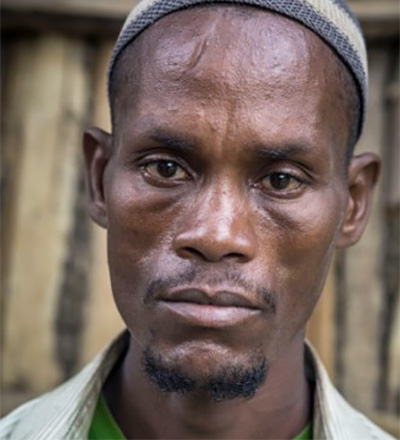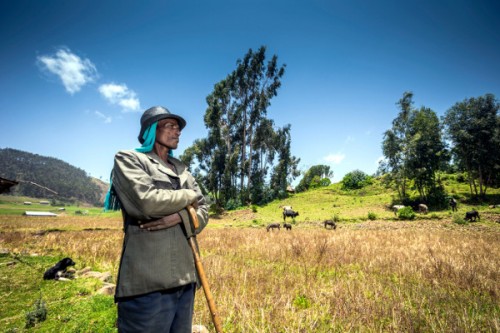As Concern Worldwide runs its Hunger Stops Here appeal, Steve Cummins reports from Addis Abba in Ethiopia – 30 years on from the famine that shocked a generation
IT’S BEEN more than 30 years since Nuru Ibrahim has seen his sister. He was seven when she left his father’s farm in search of food, never to be seen again.
To this day he has no idea what might have happened to her.
“That’s the worst experience of my life,” Nuru tells me from his home in northern Ethiopia’s Amhara region.
He can only assume that she became one of an estimated one million victims of Ethiopia’s 1984 famine, famously described by BBC reporter Michael Buerk as “the closest thing to hell on Earth”.
“It would be good to know whether she’s dead or alive, but there is no way that we can know.”
Nuru’s story is a familiar one.
In Amhara, every famine survivor has a harrowing story. Ashetu Yimer, a 55-year-old from Dessie Zuria can barely speak of those years.
“I remember seeing a child sucking off the sagging breast of their mother, who was already dead. It was horrific to see such suffering,” he says.
“I don’t even want to think about that time. It has left a scar on my mind. Now we are in a much, much better situation.”
Ashetu’s assertion is true. Although Ethiopia remains one of the world’s poorest countries, it has steadily improved in the three decades since Bob Geldof and the world were shocked into action.
Some of the change has been remarkable. It has come about due to Chinese investment, development aid, an influx of charities and a change in political ideology that has brought with it stability.
Ethiopia has been a republic since 1991 when the Ethiopian Peoples' Revolutionary Democratic Front (EPRDF) overthrew a military dictatorship.
The EPRDF have not relinquished power since and, although this has drawn criticism, few can dispute that the party has presided over a period of economic progress.
Over the past decade, Ethiopia’s GDP has shot to an average of more than 10 per cent in a region where growth is little more than five.
The country that had become synonymous with starvation is now the darling of the development community.
The scale of this progress is evident in the rapid infrastructural changes taking place across Addis Ababa, the capital. Addis offers a chaotic introduction to Ethiopia.
Here the hum of construction work is constant as cranes swing into action and workers hurry up bamboo scaffolding, giving rise to office blocks and hotels.
The city’s biggest infrastructural project is a light rail system that has the potential to alter the lives of Addis’ citizens when it opens next year.
Clues to what is fuelling this change can be found in the airport’s arrival hall.
Chinese faces are everywhere. So dramatic has been the increase in China's investment in Ethiopia that some estimate it has doubled in the past five years to more than $2billion.
Children have become so accustomed to seeing Chinese faces that the call of ‘faranji’ - Amharic for ‘foreigner’ - has been replaced by one of ‘China, China’ at the sight of any white faces.
Why China has taken to Ethiopia is unclear, although the country’s stability and cheap workforce is an attraction.
That Ethiopia follows a similar state-heavy economic model to that of China has no doubt also curried favour.
The similarities don’t end there either. Like China, human rights groups have criticised Ethiopia over the treatment of journalists and political opponents.
Yet amid the changing façade is a familiar picture of hardship. Despite its progress, Ethiopia remains a country of stark poverty, highly reliant on developmental aid.
Just this year, an Oxford University Study ranked the country as the world’s second poorest.
Although the economy has swelled, it has been matched by phenomenal population growth.
In 1984, Ethiopia’s population stood at 40million. Today, that figure has more than doubled to 94.1million.
This staggering increase has put pressure on a predominantly rural population reliant on agriculture.
Competition for arable land is fierce and food emergencies are a constant reality. It is in these areas, such as Dessie Zuria, where Concern Worldwide is working.
Here, drought and high altitudes restrict the type of crops that can be grown, with farmers largely dependent on barley.
This has impacted on chronic malnutrition, which runs at a high rate of 54 per cent – 10 per cent above the national average. Yet, in Dessie Zuria Concern is making its mark with something typically Irish – the potato.
Previously unknown in the region, potato is helping to transform the lives of thousands.
“I didn’t know potato,” says Ibre Seid, a 32-year-old farmer. “Concern gave me potato seeds, but I didn’t really believe that it was going to be of any use.”
Then came the surprise. On the same plot where he was growing 100kg of barley, Ibre yielded 2000kg of potato. “I was surprised,” he says. He now makes around 8,000 Birr (£250) a year from potato.
Concern started the potato project with 16 farmers. Seven years on, more than 10,000 farmers are now benefitting.
“Farmers were very vulnerable to food crisis because of mono cropping,” says Endalamaw Belay, Concern’s north area coordinator.
“There are no alternative crops, only barley. The nutritional value got from one food is not promising. We decided, in consultation with government, to focus on diversification. We found that the land was suitable for Irish potatoes so, based on that, we began.”
The government is now rolling out the project in other areas in a bid to increase resilience.
It is part of Concern’s integrated program that is also helping these impoverished communities with irrigation, child-feeding techniques, and the economic empowerment of women.
Belay is convinced that this integrated strategy can eradicate extreme poverty.
“If you knock on the door of one of these households you could find health problems, sanitation problems, food problems, inequality problems and more,” he tells me.
“If you focus only on solving one problem, you can’t bring any significant change as one contributes to the other. To overcome this multi-disciplinary problem, an integrated approach is very important.”
Kate Corcoran, Concern’s Tipperary-born country director, echoes Belay’s sentiment. With Ethiopia largely on track to meet its Millennium Development Goals, she believes progress has been strong. “Ethiopia is solving its problems,” she says.
“If you look at the indicators, there’s been a huge amount of progress from where we were 30 years ago. That’s due to investment by government, investment by development aid donors and the efforts of NGO’s such as ourselves.”
As Concern continues its ‘Hunger Stops Here’ funding drive in Britain, I put it to her that some might question why, after 30 years of aid, Ethiopia still has a problem with hunger. Does aid actually work?
She says Irish people need only look to Ireland to see that it does. “When we joined the EU in the 1970s our indicators as a nation were nothing like what they are now,” she says.
“So despite setbacks such as the economic crisis our standard of living is very high. We’ve had a lot of international aid in Ireland and it has worked and I think that the same will be true for Ethiopia.”
Steve Cummins’ trip to Ethiopia was paid for by Concern Worldwide. Pictures by Petterik Wiggers/Ethiopia/2014
How you can help to stop to stop hunger
 • £10 could provide life-saving food for a child for two weeks
• £10 could provide life-saving food for a child for two weeks
• £28 could buy a chicken, goat, seeds, tools and training for two families
• £47 can buy water pumps for three communities
Every donation being made until December 14 will be matched pound for pound by the UK Government, doubling the difference you can make in tackling hunger for the world’s poorest children.
Please donate by calling: 0800 032 4001 or go to concern.net/hungerstopshere.
To make a £5 donation text HUNGER to 70007.
You will be charged £5 plus one message at your standard network rate. 100 per cent of your donation will be received by Concern Worldwide (UK). Registered charity in England and Wales (1092236) and Scotland (SCO38107). To opt out of hearing further from Concern please end your text message with NOINFO. All donations received by 14/12/2014 will be doubled by the UK Government.



